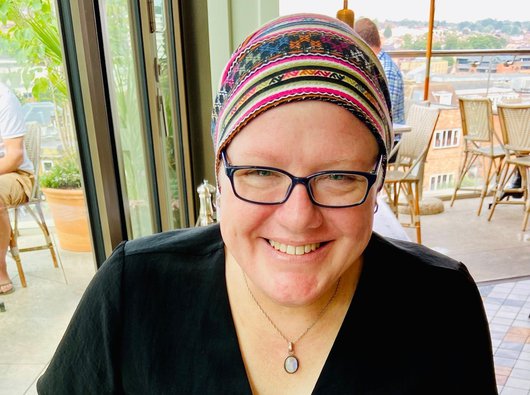Myeloma treatment aims and types
Myeloma is a treatable blood cancer. It is not curable yet, but there are lots of different treatment options, and thanks to research, more are being developed all the time.
Treatment aims
Treatment for myeloma (multiple myeloma) has two main aims:
- to bring you into remission, also known as stable phase, where there are few or no myeloma cells left in your body.
- to manage the effects of myeloma such as bone and kidney damage and improve your quality of life.
Although myeloma almost always comes back after treatment, it can be treated again.
Treatment options
There are many treatment options for people with active myeloma. These are called lines of treatment.
Your first line of treatment is likely to be a combination of drugs which aims to kill as many myeloma cells as possible. This may be followed by a stem cell transplant. This involves high dose chemotherapy followed by an infusion of your own healthy stem cells, or more rarely, stem cells from a donor.
When the myeloma comes back, you will have another line of treatment. And another the next time, and so on.
Read our information on the different lines of treatment approved for use in the UK.
"I prioritise all my health appointments and have a diary. And then I tick things off like when I finish a four-week cycle, and have a week's rest. It's like a little bit of a celebration."
Linda, diagnosed with myeloma in 2021
Read Linda’s story about facing the stigma of a blood cancer diagnosis.

Clinical trials
A clinical trial is a research study involving people. If there is one available, your consultant might suggest you join it. Clinical trials are done for several reasons, including developing new treatments and improving existing ones.
Taking part in a clinical trial has advantages, such as the opportunity to have a new treatment which might not be available outside of the trial. You’ll be very closely monitored and have detailed follow-up. But it does come with uncertainties, and you may prefer not to take part.
If you don’t want to be in a trial, or there isn’t a suitable trial running, you’ll be given the best standard treatment that’s right for you.
We have more information about clinical trials. Our clinical trials support service offers personal support to find suitable clinical trials and understand the trials process.
Treatment types
There are many drugs approved to treat myeloma and you will normally have a combination of different ones that work in different ways to kill the myeloma cells.
Treatments for myeloma have changed a lot in the last few years and there’s been a general move towards targeted treatments that are less toxic to healthy cells. Read more about our research on myeloma.
Inhibitors (cancer growth blockers)
Inhibitors are targeted drugs which block the signals that make cancer cells grow. Inhibitors used to treat myeloma include bortezomib, carfilzomib, ixazomib, panobinostat and selinexor.
Monoclonal antibodies (immunotherapy)
Monoclonal antibodies are targeted drugs which bind to and kill specific cells. Daratumumab and isatuximab are monoclonal antibodies that are effective at killing myeloma cells.
Other targeted drugs
Thalidomide, lenalidomide and pomalidomide are immunomodulatory drugs – targeted drugs which stop myeloma cells growing and help your own immune system to attack myeloma cells.
It’s essential to use a barrier method of contraception to avoid getting pregnant if you or a sexual partner are taking thalidomide, lenalidomide or pomalidomide. This is because these drugs have been known to affect the development of unborn babies.
These drugs also increase your chance of developing blood clots, which can block blood vessels and lead to deep vein thrombosis, pulmonary embolism (clots in the lungs), heart attack or stroke. So you may be given medication to thin your blood. These include aspirin, low molecular weight heparin (LMWH), or newer medications such as apixaban. LMWH is injected daily under the skin, and aspirin and apixaban are taken as a tablet.
Chemotherapy
Chemotherapy drugs work by stopping myeloma cells dividing and growing. Cyclophosphamide and melphalan are chemotherapy drugs used to treat myeloma.
"It looks like a giant mountain in front of you that you've got to climb. But you've got to just take it one step at a time. That’s what helped me get through it."
Cecelia, living with myeloma since 2020
Read how Cecelia and other are coping with a myeloma diagnosis.

Steroids
Steroids help to kill myeloma cells and work together with other drugs. They also reduce swelling (inflammation). Dexamethasone and prednisolone are steroids used to treat myeloma.
See our pages on first line treatment for myeloma and treatment for relapsed myeloma for more information about myeloma drugs and how you take them.
Stem cell transplant
All the cells in our body come from parent cells called stem cells. A blood stem cell transplant aims to put healthy stem cells back into your body so you can start producing normal blood cells.
There are two main types of stem cell transplant:
- auto (autologous or autograft) – this uses your own stem cells
- allo (allogeneic or allograft) – this uses stem cells from a donor.
People with myeloma typically have auto transplants. Occasionally allo stem cell transplants might be considered for fitter people with a particularly fast-growing type of myeloma.
An auto transplant is a way of giving stronger chemotherapy to keep you in remission for longer. The aim is to kill any myeloma cells that are left.
If your doctors think an auto transplant may be right for you, healthy stem cells will be harvested from your bloodstream once you are in remission. It’s likely that you’ll have a chemotherapy drug called melphalan to kill the remaining myeloma cells before your stem cells are returned to your body.
For more information about stem cell transplants, download or order our booklet: Blood stem cell and bone marrow transplants: The seven steps

Worried about anything or have questions?
If you need someone to talk to, please don't hesitate to contact our Support Service by phone or email.
